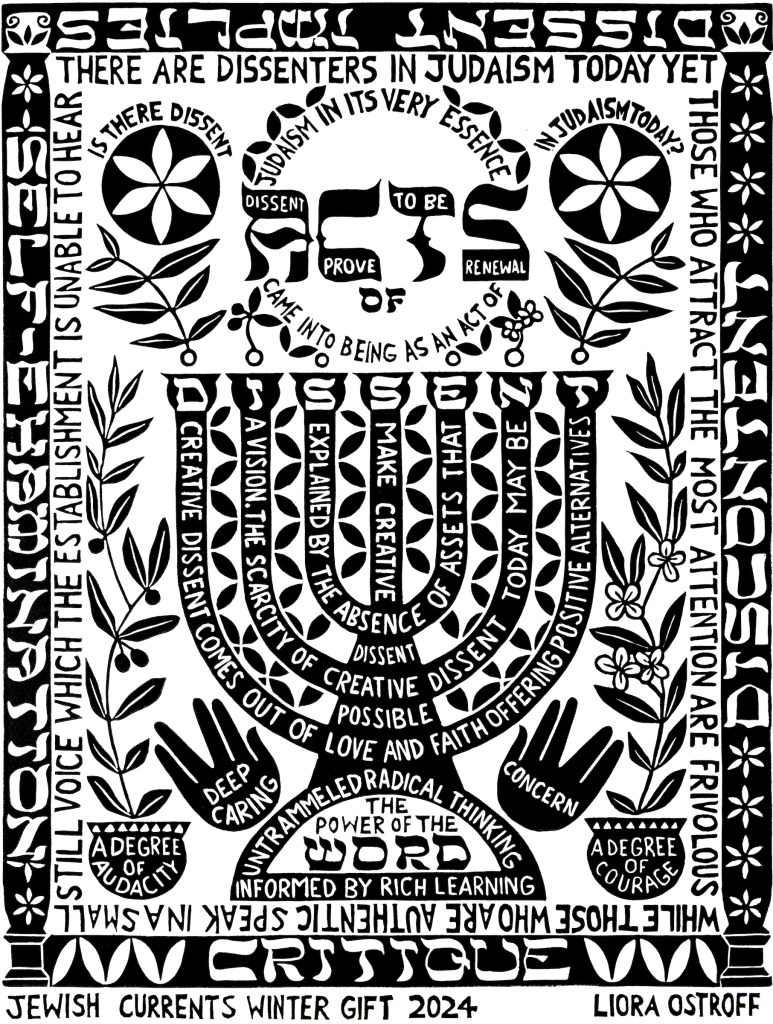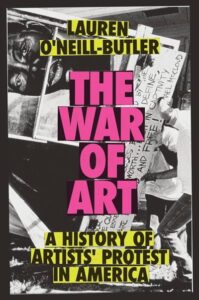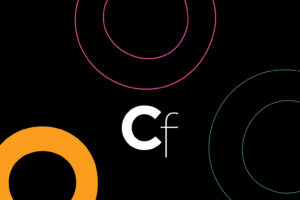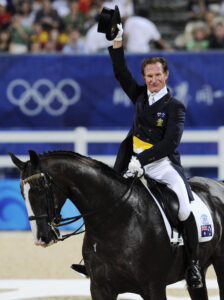High School Teacher Reprimanded for Showing Jewish Dissent Poster


Just north of Chicago, Evanston residents are campaigning in support of a Jewish high school educator after district leaders asked him to take down a protest print on display in his classroom.
Andrew Ginsberg, a longtime social studies teacher at Evanston Township High School District 202, told Hyperallergic in an email that school leaders said they had received a complaint about the poster and instructed him to remove it. Created by artist Liora Ostroff for the magazine Jewish Currents, the print features text from Rabbi Abraham Joshua Heschel’s 1971 anti-war essay “Dissent” arranged in the design of a traditional Shiviti amulet, a scribal art form of Jewish mysticism that emerged in the 18th century.
In an artist statement, Ostroff condemns Israel’s ongoing attacks on Palestinians, and Gisnberg told Hyperallergic that he has worked to “support pro-Palestinian students’ right to speak and organize.” The print, however, does not reference Palestine or Gaza.
The artwork was hanging on the door of a small storage space in the back of Ginsberg’s classroom, which he shares with other teachers. He said that when school officials told him to remove the work in early March, “they would not provide a reason, only pointing to school policies around teaching controversial subjects and interacting with students.”
After Ginsberg was warned that he would face “progressive discipline” if he refused to comply, he said, he hung up a note explaining why the print had been removed. Ginsberg told Hyperallergic that he is now under investigation for “alleged misconduct.”
On May 21, just over a week after 18 Evanston community members advocated for Ginsberg in a school board meeting, the school district’s Board of Education (BOE) published an essay in the Evanston Roundtable defending its decision.
“We fully support our educators in facilitating courageous conversations and trust our students to engage with critical questions and challenging ideas about the world around them. At the same time, we recognize the inherent power dynamics within a school setting,” the essay reads.
“With that comes the responsibility to ensure that no student ever feels unwelcome or unsafe in our school environment — particularly based on their identity, beliefs or perspectives,” the text continues.
An email drive launched on Sunday, May 18, by a coalition of local residents known as Evanston Ceasefire has so far sent more than 3,200 letters to BOE members and school officials decrying their actions as a violation of free speech and calling on them to rescind the notice.
The response of Evanston school officials has not only received pushback from local community members, but also from Ostroff, the Baltimore-based artist who created the print. She said that she was “flummoxed” by the actions taken by Evanston school officials in a letter to the editor in the Evanston Roundtable.
Ostroff, who is also Jewish, told Hyperallergic in an email that she agrees with Evanston community organizers’ characterization of the censorship as “antisemitic.”
“One of the most perplexing things about this whole situation is that the school board has been unable to actually name what, exactly, is offensive or discomfiting about the print. And because they won’t say it outright, that makes it difficult to respond,” Ostroff added.
In response to Hyperallergic’s inquiry, a BOE spokesperson declined to comment on the matter, referring Hyperallergic to the district’s Board Policy Manual and the National Education Association’s legal and employment guidance on public school educator speech rights.
A section titled “Teaching About Controversial Subjects” in the policy manual states that school-sponsored presentations of “controversial or sensitive topics” must present a “balanced academic recognized research view” and respect the rights and opinions of everyone. The section also lists as a reference the 2006 Supreme Court decision Garcetti v. Ceballos, which ruled that public employees are unprotected by the First Amendment for speech related to their job.
The National Education Association’s guidelines state that public employers may sometimes limit educators’ speech when it is deemed to be “too disruptive” and provokes protests, complaints from students and families, and negative community attention.
Ginsberg said that the Evanston Ceasefire campaign has made him feel “touched and validated.”
“I think that more and more members of the community see and are upset by the fake progressivism and hypocrisy exhibited by district leadership,” he said.




